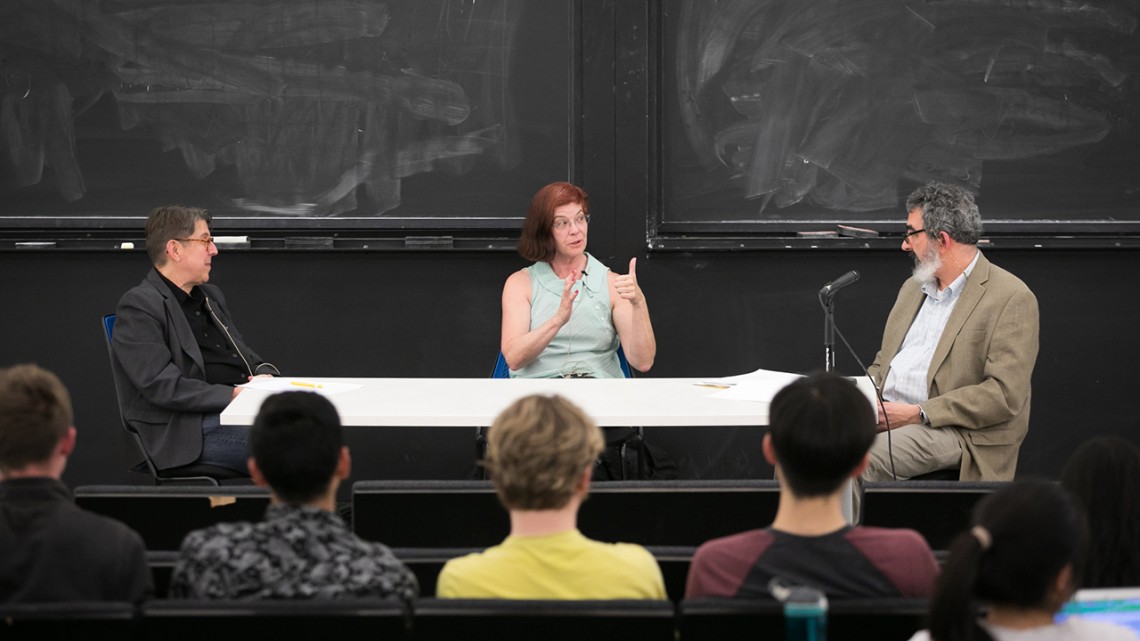
Mitchell Baker, center, chairwoman of Mozilla, talks with Bruce Lewenstein, right, professor of science communication and chair of the science and technology studies department, and Amy Villarejo, professor of performing and media arts and faculty director of the Milstein Program, during a conversation on campus May 1.
Mozilla co-founder shares vision for future of tech
By Kathy Hovis
Open source software, a web of connections, a tool for meaningful collaborations, a powerhouse research tool – when Mitchell Baker thinks of the things that the internet gets right, those are at the top of the list.
But there are also things the internet gets wrong. And Baker, chairwoman of Mozilla and co-founder of the Mozilla Project, said most of those come about when companies – led by humans – “create very powerful systems with very limited systems of accountability.”
Baker spoke on campus May 1 as a guest of the Milstein Program in Technology and Humanity and the Department of Science and Technology Studies in the College of Arts and Sciences.
She talked about the early days of Netscape, the first widely used internet browser, and the company’s decision to release its source code to the public. That led to the creation of the Firefox browser, the Mozilla Foundation and the Mozilla Project, a collective of employees and volunteers working to make the internet open and accessible to all.
“When the internet first came to consumers, we called it the web because it embodied our hopes for what it meant for society,” Baker said. “In the early days, we saw it as a concept with maximum capability and possibility aimed at positive, collaborative problem-solving. It was an immense place to bring about individual empowerment, openness, liberty and a range of choice to a human being.
“But the tool has outpaced our understanding as a society about who we are and accountability and decency,” she said.
Baker spoke in conversation with Bruce Lewenstein, professor of science communication and chair of the science and technology studies department; and Amy Villarejo, professor of performing and media arts and faculty director of the Milstein Program. They discussed ethics, privacy, internet addiction, regulation and internet violence.
Lewenstein asked Baker to consider what the next generation of technology leaders will need to know in order to balance the economic and the ethical, the social and the humanitarian, in the tech world.
“There needs to be an enhanced understanding of the interaction between technology and humanity,” she said, “so clearly understanding the human brain is important – how we build patterns, how we process information, that’s a field that is rich and growing all of the time.”
She also stressed the importance of working collaboratively across fields to solve large-scale problems. Another priority, she said, has to be understanding how technology is used to stoke outrage, violence and lack of rational thought.
“That affects everything,” she said, “and the ability to manipulate a system to drive that in a large population [is important to understand]. It’s hard to solve other huge problems until we can figure that out.”
Baker’s talk was supported by the Milstein Program – which was launched in 2017 through the generosity of Howard P. Milstein ’73, Abby Milstein and Michael Milstein ’11 – and by a gift from Robin Panovka ’83 (philosophy), a partner at the law firm of Wachtell, Lipton, Rosen & Katz in New York City.
Kathy Hovis is a writer for the College of Arts and Sciences.
Media Contact
Get Cornell news delivered right to your inbox.
Subscribe
